Select Language

By Nupur Anand
NEW YORK (Reuters) -JPMorgan Chase said in a filing on Wednesday that its assets in Russia may be seized after lawsuits in Russian and U.S. courts.
The bank faces several legal challenges over its Russian dealings after the U.S. and European nations imposed economic sanctions on Russia in response to its invasion of Ukraine.
The value of claims and orders to freeze assets exceeds JPMorgan's available assets in Russia, the largest U.S. lender said. JPMorgan Chase (NYSE:JPM) did not specify the amount of its assets in Russia.
A Russian court last month ordered the seizure of funds in JPMorgan accounts after Russian state-owned bank VTB sued to regain its funds blocked abroad.
Meanwhile, JPMorgan sued Russia's VTB Bank as the U.S. lender sought to block VTB's effort to recover $439.5 million.
JPMorgan's Russian assets are worth less than VTB's claims alone, a source said. These assets could range from cash to real estate to office equipment. JPMorgan declined to comment beyond the filing.
JPMorgan accused Russian courts of ignoring the bank's contractual rights and obligations, and disregarding its inability to make various payments because of sanctions laws.
JPMorgan said U.S. law prohibits it from releasing funds to sanctioned companies, including VTB, which was put on the U.S. Department of the Treasury's sanctions list in February 2022.
Separately, the bank expects to enter into a resolution with a third U.S. regulator that will require it to pay a civil penalty of $100 million for reporting incomplete trading data to surveillance platforms, it said.

By Leika Kihara
TOKYO (Reuters) -Many Bank of Japan board members agreed the country's long-term interest rates should be set by markets, with some saying the central bank should at some point slow the pace of bond buying, minutes of their March policy meeting showed on Thursday.
At the March meeting, the BOJ ended eight years of negative interest rates and its bond yield control in a historical shift away from its prolonged radical stimulus programme.
"With respect to yield curve control, many members expressed the view that it was appropriate for the Bank to change its framework. These members shared the view that long-term interest rates would be determined by financial markets in principle," the minutes showed.
While one member said the BOJ should take time adjusting the pace of bond buying, others saw the need to breathe life back to a market made dormant by its huge presence, the minutes showed.
"Some members expressed the view that it was desirable for the Bank to reduce the amount of Japanese government bond (JGB) purchases at some point in the future, and also reduce the amount outstanding of its JGB holdings through redemptions of JGBs," the minutes showed.
The remarks underscore the BOJ's resolve to start tapering its bond-buying once markets restore calm from the March policy shift, and eventually reduce its massive balance sheet.
At a subsequent meeting in April, the BOJ kept interest rates around zero but projected inflation to stay near its 2% target in coming years. It also made no change to its guidance offered in March to keep buying government bonds at roughly a pace of 6 trillion yen ($38.5 billion) per month.
Financial markets are focusing on when the BOJ could start to significantly reduce its bond buying, with some traders betting it could do so soon to allow long-term yields to rise and help slow the yen's declines.
BOJ Governor Kazuo Ueda on Friday brushed aside the chance of using the bank's bond buying or its monetary policy as tools to directly influence the yen.
In a sign the BOJ could face political push-back in raising rates further, government representatives who attended the March meeting voiced hope the central bank will keep supporting the fragile economy with low interest rates, the minutes showed.
"The BOJ must continue firmly offering financial support to the economy to ensure it achieves sustainable growth led by private demand," a Cabinet Office official was quoted as saying.
At the March meeting, the board also discussed staff findings on the long-term impact of the BOJ's past monetary easing measures, including on the exchange-rate market.
A few members said the yen's value had deviated notably from purchasing power parity. One of them said this might be because market players have come to focus more on the interest-rate gap between Japan and other countries, the minutes showed.
Another member said there were significant differences between current stock and exchange-rate levels, and those before the BOJ's introduction of massive monetary stimulus in 2012.
This member said the differences could be a result of changes in the transmission mechanism of monetary policy, as well as its positive ripple effects and side effects, the minutes showed.

By Jihoon Lee
SEOUL (Reuters) - South Korea's factory activity contracted again in April, but manufacturers' optimism climbed to the highest level in nearly two years as output and orders managed to post marginal growth, a private-sector survey showed on Thursday.
The purchasing managers index (PMI) for manufacturers in Asia's fourth-largest economy, compiled by S&P Global, fell to 49.4 in April, from 49.8 in March, on a seasonally adjusted basis.
It was the second month that the index had dipped below the 50-mark, which separates expansion from contraction, and the lowest reading since August 2023.
"While output and new orders returned to fractional growth territory, the headline PMI was weighed down by falling employment and stocks of purchases," said Usamah Bhatti, economist at S&P Global Market Intelligence.
"Falling employment, backlogs and inventories suggest that the sector still has some way to go before growth can be sustained."
The South Korean economy grew at the fastest pace in more than two years in the first quarter, data showed last week, beating all estimates on the back of a pick-up in domestic consumption and robust exports.
In the manufacturing survey, sub-indexes for output and new orders rose in April to 50.1 and 50.3, respectively, after falling below 50 in March for the first time in three months.
New export orders grew for the fourth straight month in April on strong demand from mainland China and the wider Asia-Pacific region, but the pace was a bit slower than the prior month, the survey showed.
On a negative note, employment fell in April after 11 months of increases, while inflation in both input and output prices were the sharpest since November.
Even so, manufacturers' optimism for the year ahead logged the highest reading since May 2022, as firms hoped for a sustained recovery in domestic and export orders, aided by new product launches and lower interest rates.

By David Lawder and Michael S. Derby
NEW YORK (Reuters) -The looming U.S. presidential election will not influence the Federal Reserve's interest rate decisions, Fed Chair Jerome Powell said on Wednesday, adding that policymakers were "at peace" with keeping political considerations out of their decision-making process.
Powell, speaking in a news conference after the end of the U.S. central bank's latest policy meeting, said Fed policy decisions will be guided by "what we think the right thing for the economy is," repeating a long-held stance of ignoring politics in the central bank's economic analysis.
"If you go down the road, where do you stop? And so we're not on that road," Powell said. "We're on the road where we're serving all the American people, and making our decisions based on the data and how those data affect the outlook and the balance of risks.
The issue of the Fed's independence jumped back into the spotlight last week when the Wall Street Journal reported that allies of former President Donald Trump are drafting proposals that would attempt to erode the central bank's independence and give Trump more influence over the Fed if he wins the Nov. 5 election.
Trump, who nominated Powell to be Fed chief in late 2017, unleashed withering verbal attacks on the Fed for raising rates in 2018, calling its policymakers "boneheads" and "loco" and threatening to fire or demote Powell on multiple occasions. But the controversy was not mentioned in the Fed's 2018 meeting transcripts, which were released earlier this year.
Powell said that Fed meeting transcripts also show no evidence that officials have allowed the pending election to affect their policy choices.
When it comes to the election, "we're at peace over it, we know that we'll do what we think is the right thing, when we think it's the right thing" Powell told reporters.
U.S. Treasury Secretary Janet Yellen, who preceded Powell as Fed chief, also put in a plug for the central bank's independence on Wednesday, releasing excerpts of a speech she will deliver on Friday in the battleground state of Arizona in which she warns that the erosion of democratic institutions would hurt U.S. economic growth and prosperity.
"As Chair of the Federal Reserve, I insisted on the Fed’s independence and transparency because I believe it matters for financial stability and economic growth," Yellen will say, according to the excerpts. "Recent research has been consistent with my belief: It has shown that greater central bank independence is associated with greater price stability, which contributes significantly to long-term growth."
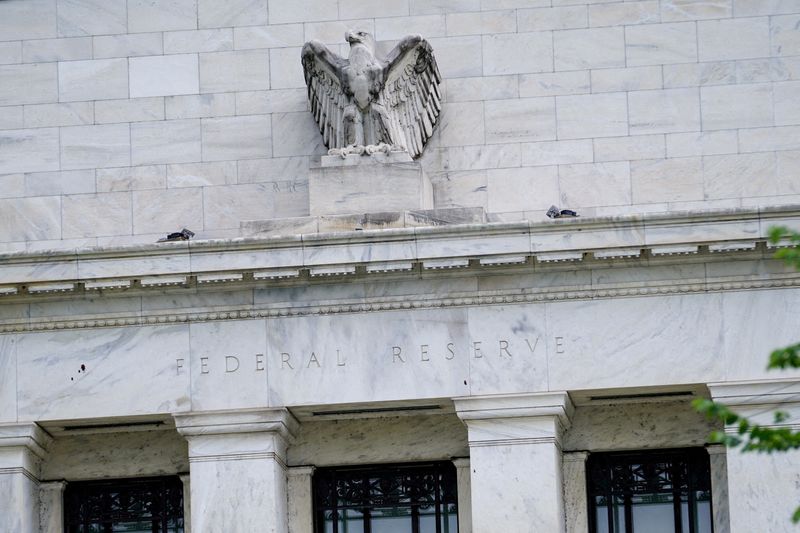
By Gertrude Chavez-Dreyfuss
NEW YORK (Reuters) - Options on Secured Overnight Financing Rate (SOFR) futures are showing a higher probability that the Federal Reserve could hike interest rates a quarter percentage point this year and next as U.S. inflation and the labor market remain resilient.
Bond investors look to SOFR futures, among other indicators, to gauge expectations on Fed policy rates. Options, on the other hand, are widely used to hedge against expected moves, with "vol" or volatility a key input in the price.
SOFR, currently at 5.31%, measures the cost of borrowing cash overnight in money markets collateralized by U.S. Treasuries. It is the benchmark rate used to price dollar-denominated derivatives and loans.
Odds for a rise in SOFR are low, though not insignificant. Few market participants actually expect the Fed to hike again. It could well be that the Fed cuts rates just once this year or not at all, and hold them higher for longer.
Analysts said it would take a full-blown re-acceleration in inflation for the Fed to tighten again. That is not the baseline scenario for most economists.
Inflation remains stubborn despite slowing late last year after 15 months of aggressive rate hikes that the Fed halted in July. Data on Thursday showed that core U.S. personal consumption expenditures inflation rose 3.7% in the first quarter, after growing 2% in the fourth.
Friday's monthly report on PCE inflation for March showed 0.3% growth, the same as February, while over 12 months inflation rose 2.7%, worse than February's 2.5% and further from the Fed's 2% target.
"If you look purely at the data and you did not have the rhetoric coming from central banks, we would be pricing in hikes, not cuts," said Akshay Singal, head of short-term interest rate trading at Citi.
"And the fact that central bankers have been of the view that they've done enough is being challenged quite aggressively now."
The option-implied probability for SOFR to rise 25 basis points to 5.56% by December has risen to 29%, Barclays estimates showed, from about 26% in early April.
The prospect of a no-cut scenario for 2024 is 31%, up from 20% a month ago, BNP Paribas (OTC:BNPQY) data showed. Chances of the first 25-bp hike in 2025 are at 22%. Volume though is typically thin the further out the curve so that number can change.
Gennadiy Goldberg, head of U.S. rates strategy at TD Securities, said the increase in pricing reflects the uncertainty investors face in an environment of strong growth and persistent inflation.
"The longer we stay at higher rates and the economy stays strong and inflation sticky, the more investors will question whether the Fed is doing enough," he added.
MARKET BIASED TOWARD CUTS
Even so, SOFR futures have priced in about 30 basis points in easing for 2024.
"There's a very high threshold to price a shift in Fed policy," said Bruno Braizinha, rates strategist at BofA Securities. "U.S. data needs to improve by a lot for the market to abandon rate cuts and transition to pricing hikes."
The rise in implied volatility in interest rate swaps, a corner in the fixed income space investors use to hedge interest rate risk, has accompanied the increase in rate-hike odds with rising uncertainty over Fed outcomes.
Rate swaps measure the cost of exchanging fixed-rate cash flows for floating-rate ones, or vice versa.
Implied vol is a gauge of how much the option market believes rate swaps will move in either direction over a given time frame. The higher the vol, the greater the perceived instability over a given period.
Volatility on shorter-dated swaptions such as one-year at-the-money options on one-year swap rates, that part of the curve in which Fed policy is being priced, rose to a price of 28.62 bps on Thursday, the highest since April 17.
So-called receiver swaptions, a type of option that pays off when interest rates fall, are still in demand. In a receiver swaption, the holder of the option chooses to pay a fixed interest rate in exchange for receiving a floating rate.
But the price for those receivers have cheapened a bit on shorter maturities, suggesting that demand may be easing as rate cuts are factored out.
"The baseline case for now is no-landing," BofA's Braizinha said, referring to a scenario where the U.S. economy avoids recession. And that, he said, does not necessarily warrant a rate hike.
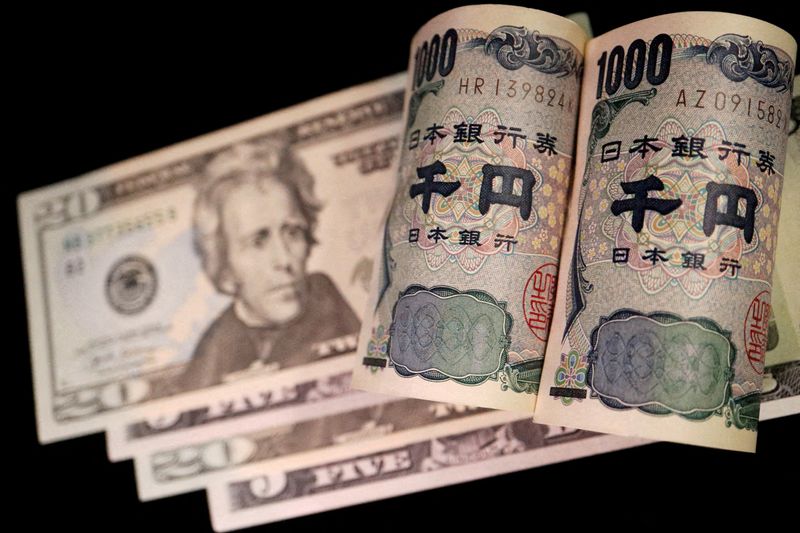
By Brigid Riley
TOKYO (Reuters) -The yen struggled to hold its line against the dollar on Tuesday after making sharp gains the previous day sparked by suspected intervention by Japanese authorities.
The currency inched down 0.30% to 156.79 per dollar but was well off its 34-year low of 160.245 hit on Monday when traders say yen-buying intervention by Tokyo drove a eye-catching rebound of nearly six yen. It briefly popped above 157 earlier in Tuesday's session.
Japanese authorities haven't confirmed that they had stepped into the currency market in support of the yen, but markets remain on heightened intervention alert ahead of the Federal Reserve's monetary policy review this week.
Official figures that would reveal whether intervention did in fact occur won't be available until late May.
While some market players had zeroed in on 160 yen per dollar as the possible trigger for intervention, analysts said Japanese authorities may not be targeting particular levels.
"Obviously, the still wide policy rate gulf between the Fed and BOJ could continue to keep USD/JPY buoyant. For that reason, we believe Japanese officials desire more flexibility in terms of what levels to intervene at," said Wei Liang Chang, a currency and credit strategist at DBS.
Despite the yen's biggest one-day gain this year on the dollar, the Japanese currency still sits lower than it was before the Bank of Japan's (BOJ) policy announcement last week. It has also suffered its largest monthly decline since January.
The BOJ's go-slow approach on interest rate increases, following its landmark decision to ditch negative rates in March, has traders betting that Japanese bond yields will remain low for an extended period. In contrast, U.S. rates are still relatively high and provide enough latitude for yen bears.
The Fed begins its two-day monetary policy meeting on Tuesday, where it's expected to hold rates at 5.25%-5.5%, with U.S. inflation proving to be sticky.
It's also expected to strike a hawkish message, meaning more yen selling is likely, said Carol Kong, a currency strategist at the Commonwealth Bank of Australia (OTC:CMWAY).
"The implication is the MOF will likely be forced to step in more than once to slow the rise in USD/JPY."
DIVERGENT ECONOMIC OUTLOOKS
While the timing of any possible rate hikes by the BOJ remains vague, traders continue to pare back bets of Fed rate cuts this year amid hotter-than-expected U.S. economic data and stubborn inflation numbers.
A rate cut in September was looking like a close call at just 44%, according to CME Group's (NASDAQ:CME) FedWatch tool.
The dollar rose to 0.14% to 105.83 against a basket of currencies ahead of the Fed's meeting, after slipping 0.25% in the previous session.
However, other major central banks such as the European Central Bank (ECB) and the Bank of England may begin to cut rates in the near future.
Markets could glean more clues on the timing of ECB's rate-easing cycle from European inflation data this week due later on Tuesday.
The euro fell 0.17% to $1.0701. Sterling was last trading at $1.2541, down 0.16% on the day.
Elsewhere, a soft retail sales number out of Australia sent the Aussie sliding, last down 0.53% at $0.653, as markets further trimmed the risk of another rate hike by September.
The kiwi fell 0.50% to $0.595.
In China, manufacturing and services activity both expanded at a slower pace in April, official surveys showed, suggesting some loss of momentum for the world's second-biggest economy at the start of the second quarter.
The offshore Chinese yuan slipped 0.14% to $7.2523 per dollar.
The yuan has lost 2% against the dollar so far this year and is on course for its fourth straight monthly onshore loss.
In cryptocurrencies, bitcoin last rose 1.07% to $63,618.00.
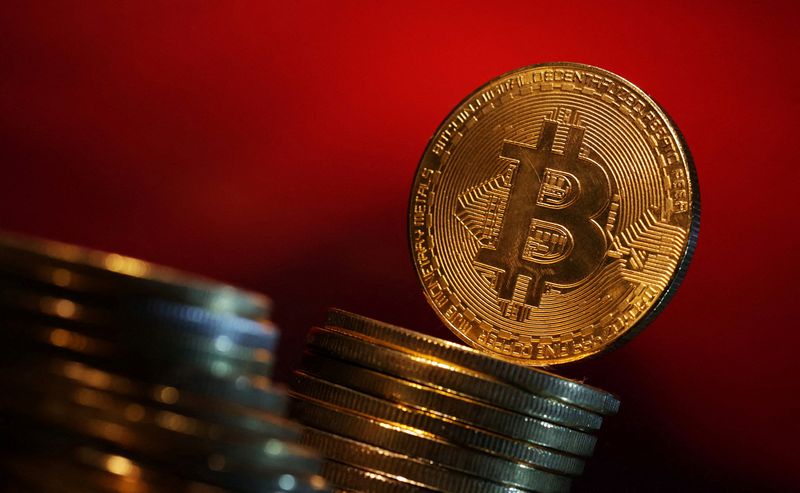
By Summer Zhen
HONG KONG (Reuters) -Six spot bitcoin and ether exchange traded funds (ETFs) gained in their Hong Kong debut on Tuesday, with the three bitcoin ETFs climbing more than 3% in early trade, reflecting Asian investor enthusiasm for cryptocurrencies.
The debuts mark the first launch of spot cryptocurrency ETFs in Asia and come just three months after the U.S. launched its first ETFs to track spot bitcoin.
Spot bitcoin ETFs launched by China AMC, Harvest and Bosera had gained roughly 2.5% as of 2:21 GMT. The three ether ETFs managed by the asset managers also rose.
Bitcoin climbed about 1%.
Cryptocurrency is banned in mainland China, but Hong Kong has been promoting itself as a global digital asset hub, part of a drive to maintain its allure as a financial center.
Christina Choi, an executive director of the Securities and Futures Commission (SFC), hailed the product debut as a milestone in Hong Kong's ETF market, but also flagged risks.
"Virtual assets are quite speculative and very volatile ... so I remind you that such assets are not suitable for all investors," Choi told Tuesday's launch event.
The ETF launch also put Hong Kong in direct competition with the United States for crypto investors.
The U.S. spot bitcoin ETFs have drawn roughly $12 billion in net inflows, contributing to a surge in bitcoin's price earlier this year. But U.S. regulators have not yet approved ETFs that track spot ether prices.
COMPETITION
Another difference is that Hong Kong's crypto ETFs adopt the so-called "in-kind" transaction mechanism that allows investors to buy and sell ETF shares using the relevant crypto tokens instead of cash.
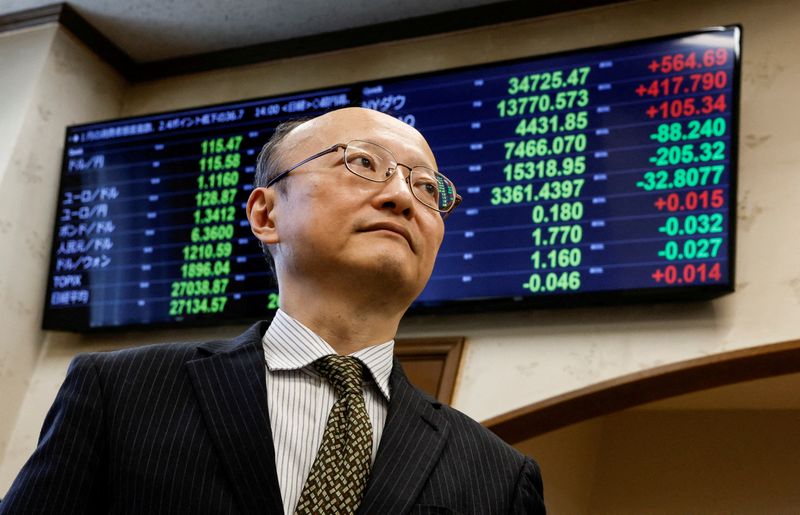
TOKYO (Reuters) -Japan's top currency diplomat Masato Kanda said on Tuesday that authorities were ready to deal with foreign exchange matters "24 hours", while declining again to comment on whether the finance ministry had intervened to prop up the yen a day earlier.
"Whether it's London, New York or Wellington (hours), it doesn't make a difference," the vice finance minister for international affairs told reporters a day after the dollar tumbled to a low of 154.40 yen from as high as 160.245 in what traders cited as intervention.
Kanda reiterated that the government would continue taking appropriate action when needed and respond to foreign exchange moves in accordance with rules set under international frameworks such as the Group of Seven advanced countries and International Monetary Fund.
Japan's currency surged as much as five yen against the dollar on Monday after the currency hit fresh 34-year lows earlier in the day.
The Wall Street Journal reported that Japanese financial authorities had intervened in the market, citing people familiar with the matter.
Kanda on Monday declined to comment when asked by reporters whether authorities intervened in the currency market, but said the current developments in the currency market were "speculative, rapid and abnormal" and could not be overlooked.

By David Shepardson
WASHINGTON (Reuters) - Nearly all new passenger cars and trucks sold in the United States will be required to have automatic emergency braking systems by September 2029, the National Highway Traffic Safety Administration (NHTSA) said on Monday, saying that the rule will save at least 360 lives annually and prevent at least 24,000 injuries.
The new rule comes as traffic deaths have spiked following the COVID-19 lockdowns.
Congress directed the NHTSA in the 2021 infrastructure law to create a rule to establish minimum performance standards for automatic emergency braking (AEB) systems, which use sensors like cameras and radar to detect when a vehicle is close to crashing and then automatically applies brakes if the driver has not done so.
The rule requires that systems detect pedestrians in both daylight and at night. Some small-volume manufacturers will be allowed to comply by September 2030.
The NHTSA in 2023 had proposed requiring nearly all vehicles to comply three years after publication, but automakers are now being given five years.
The NHTSA is requiring all cars and trucks be able to stop and avoid striking vehicles in front of them up to 62 miles per hour. The rule requires the system to apply brakes automatically up to 90 mph when collision with a lead vehicle is imminent, and up to 45 mph when a pedestrian is detected.
U.S. traffic deaths fell by 3.6% in 2023, the second straight yearly decline, but they remain significantly above pre-pandemic levels.
The fatality rate in 2023 was higher than any pre-pandemic year since 2008. In 2022, the number of pedestrians killed rose 0.7% to 7,522, the most since 1981.
In 2016, 20 automakers voluntarily agreed to make automatic emergency braking standard on nearly all U.S. vehicles by 2022. In December 2023, the Insurance Institute for Highway Safety said all 20 automakers had equipped at least 95% of vehicles with AEB.
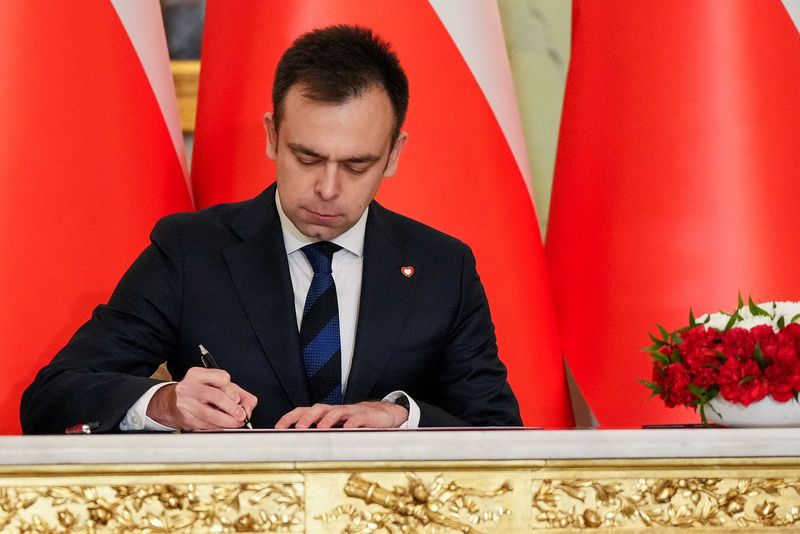
By Karl Badohal
WARSAW (Reuters) - Poland is taking steps to increase the transparency of its public finances Finance Minister Andrzej Domanski told reporters, amid rising debt servicing costs.
Measures will include a review of public finances, to be published by the ministry on Monday, reining in out-of-budget spending, and establishing an independent fiscal council to assess government policy, he said.
"I will be encouraging the government to move towards maximum transparency," he told reporters on Friday in comments cleared for publication on Monday morning.
Poland is among nearly a dozen European Union countries at risk of being put under the bloc's excessive deficit procedure, imposed on those whose deficit limits exceed 3% of gross domestic product (GDP).
Warsaw, whose deficit is seen increasing at year-end to 5.4% according to a Reuters poll, points among others to spending more than 4% of economic output on defence, as Russia continues its attack on neighbouring Ukraine.
Domanski said his aim was to repair public finances following several years of elevated off-budget spending by the previous Law and Justice (PiS) government since the COVID-19 pandemic.
"Starting April 30, state-owned development bank BGK will start publishing data on all of its funds in terms of execution and current plans on a quarterly basis," he said.
He said he was in favour of merging some of BGK's funds and the finance ministry would cooperate with the bank and other ministries on this.
LONG-TERM PLAN
Poland's annual long-term financial plan, to be adopted by the government on Tuesday, will also include the framework for establishing a fiscal council to monitor government policy, including macroeconomic projections and the budget bill, Domanski said.
"It of course must be an independent institution and everything it publishes must be made public ... It has to have its own firepower when it comes to criticizing the finance minister for submitted assumptions to the budget act."
He said he expected the project to be made public within a few weeks.
Domanski noted that Poland's debt servicing costs were among the highest in the EU and said he was looking at its smaller neighbour, the Czech Republic, as a guide.
"This is a problem that will get even worse in the coming years - the debt servicing costs in relation to GDP will increase, although fortunately only slightly," he said, adding that policy changes at the U.S Federal Reserve and other main central banks were pressuring emerging markets.
"I am looking at the spread to Czech bonds - my goal is for this spread to narrow."
Domanski also said he was eyeing more private investments, in addition to higher consumption, as a driver of economic growth. "Private investments are very important to me, which is why we are talking to investors in Poland and abroad."

